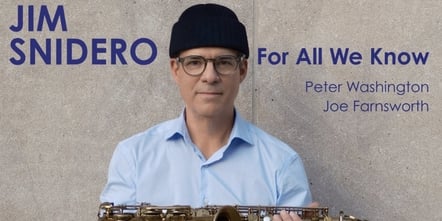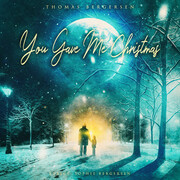New York, NY (Top40 Charts) Sound forms the basis of everything that follows. For musicians, there is no greater truth. And for alto saxophonists specifically, that gospel, and the difficult trials it presents, is magnified to the fullest. A horn not easily tamed, the alto illuminates its every utterance. Simply put, the instrument is a decisively indicative test, and nobody scores quite as high on it as Jim Snidero.
With a tone quality that's second to none - Stereophile cited his sound as "one of the richest and purest on the planet" - this lauded artist has showcased an enviable resonance in myriad contexts over the better part of the past four decades and 25 previous releases. Now, placing himself in the most exposed setting he's ever inhabited, Snidero reaches the apex on the alto saxophone.
For All We Know, a significant milestone by numerous measures, marks the first time that Snidero sets his sights on the saxophone trio format. He states that "Up until now, I honestly didn't quite have the confidence to cut loose the piano or guitar. They add so much color and rhythm to the group, and it's just something I hear when playing and composing. But at this stage of my development, I feel that my sound and style have solidified to the point where I can sustain interest without a chordal instrument."
Having reached that veracious conclusion, and realizing the time was right, Snidero set about to form the perfect trio for this watershed project. And in doing so he was absolutely committed to the magical combination of bassist
Peter Washington and drummer Joe Farnsworth. "It would be a challenge to find a living bassist and drummer with more experience than
Peter and Joe," the saxophonist accurately states.
"They've literally worked with some of the best jazz musicians in history—Art Blakey, McCoy Tyner, Tommy Flanagan, and Cedar Walton, just to name a few—and they've recorded together on many occasions." In fact, that dream team formed the rhythmic core of Snidero's most recent projects—Live at the Deer Head Inn (Savant, 2021), a COVID-era capture that wowed fans and earned a prestigious 5-star review in DownBeat Magazine, and Far Far Away (Savant, 2023), which saw Snidero moving to the outer limits alongside guitar great Kurt Rosenwinkel. Looking to the present, they now join this celebrated leader in a scaled-back environment, firing the imagination through the act of fellowship on this remarkably engaging date.
Starting things off with the J. Fred Coots/Sam M. Lewis-penned title track, Snidero and company indicate a predilection for mellow moods and pliant play. The saxophonist's melodic discourse immediately draws and continuously holds attention, a loose-laid feel gains serious grip with a walking bass line and sticks on ride, and an alto cadenza—the longest Snidero has ever recorded—proves spellbinding at song's end. A significant spotlight on rare virtuosity, that expansive exit work exhibits new ideas on the instrument. And the performance as a whole highlights Snidero's sublime artistry while placing him in the pantheon of all-time alto greats.
A trip through "Naima'' follows and fascinates. Washington offers a mystical welcome that connects to an extremely relaxed Latin groove, Farnsworth calmly carries the music forward and Snidero's horn sings to spiritual awakening. Paired with the opener, this
John Coltrane classic maintains and enhances the low-gear leanings that largely define the album.
Briefly leaving those pacific pursuits behind, Snidero raises the tempo, spotlights his close association with Washington and encourages Farnsworth to power through on a seriously swinging take on Cole Porter's "Love for Sale." Then he returns to scenes of serenity, offering up one of the most beautiful numbers he's ever performed in the form of Alec Wilder and Loonis McGlohon's "Blackberry Winter."
Another example of the strong bond between bassist and leader, and a true showcase for each, it gives pause to consider and appreciate their longstanding relationship. "Peter and I first connected in the studio on Mixed Bag (Criss Cross, 1987). It was my second album as a leader, and it was his second recording ever," Snidero joyously notes. "And though
Peter had never done an entire album in a saxophone trio setting like this before, he was clearly the ideal choice, adding just the right amount of interplay to fill things out. In my opinion he's one of the very best to ever play the instrument, always delivering with incredible knowledge, nuance, and musicality."
Bowing to Bird as the second half of the set unfolds, Snidero signals his strength of sound and phrasing through the iconic intro and tag on "Parker's Mood." Further nodding to his musical forebear, the saxophonist references the composer's solo via his own slow and bluesy stand. Shifting stylistic and metric gears, Snidero and his trio mates sizzle on a slyly waltzing rendition of Ann Ronell's "Willow Weep for Me."
"That piece played in 3/4 time is really a nod to Phil Woods, who recorded a faster version on Musique Du Bois (Muse, 1974)," Snidero explains. "Phil was a great inspiration to me as a teenager, and I used to drive up from Maryland to his place in Delaware Water Gap to take lessons whenever I could. Shortly before he passed I promised him that I would try to carry on the alto tradition, and I do feel like I'm part of that lineage. I truly love the alto, and work hard to do it justice."
Having rightly earned his place as a keeper of the flame who's carved out his own path and crafted his own style, and undeniably mastered the instrument and language, Snidero wows with those aforementioned performances and continues to impress with the smart, parting pairing of Richard Rodgers and
Lorenz Hart's "My Funny Valentine" and Coots and
Haven Gillespie's "You Go to My Head."
The former, one of the music's most challenging ballads, with a long form and dangerously repetitive melody, smolders and seduces with pure pathos; and the latter, an old favorite of Snidero's, speaks to the power in swinging scenarios while highlighting what makes Farnsworth such a fine musician. "The two things I love about Joe are that beautiful swing feel and the way he listens and complements the soloist," Snidero notes. "He's a team player who's all about the music, not showing off or overwhelming with action. And he's a master at adding interest to the arrangement. He really has great instincts."
Regarding instincts, the same can obviously be seen in the leader when considering not only his creative broadmindedness, but also a steadfast approach to the alto and how that relates to these current travels.
"As an improviser, I'm open to all kinds of concepts. But when it comes to the horn, I'm pretty traditional. I mean, there are certain timeless technical aspects of tone, such as resonance, timbre, projection and so on, that apply to all instruments. My reference has always been the greatest jazz saxophonists, with the goal being to create my own voice with the same level of depth. In this trio setting in particular, there's no chordal instrument filling out the soundscape so tone, clean technique and phrasing become more apparent. You're really under a microscope, but if you're together on the instrument those very aspects stand out." And boy do they ever on For All We Know.
























